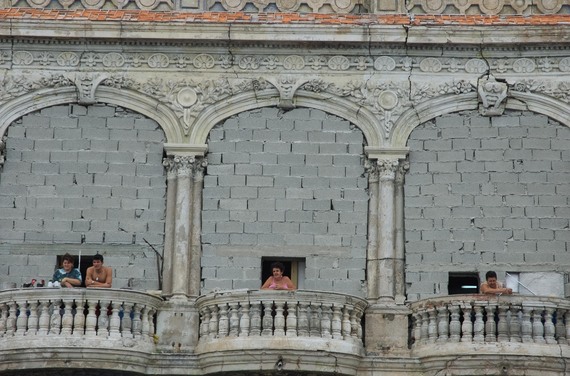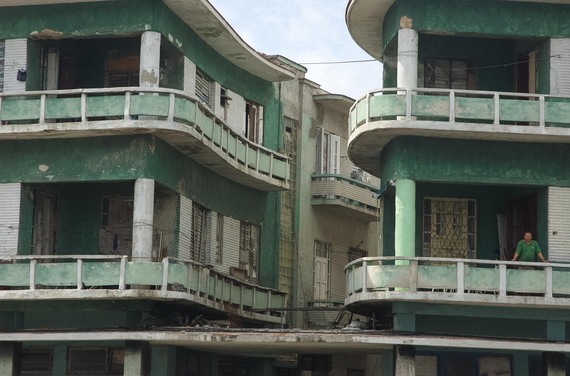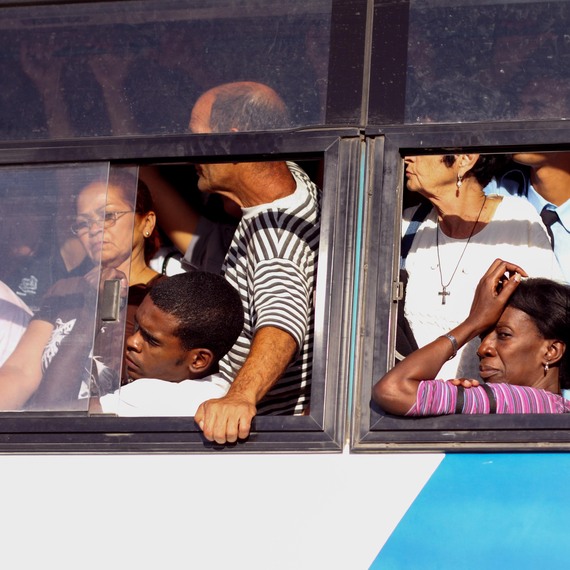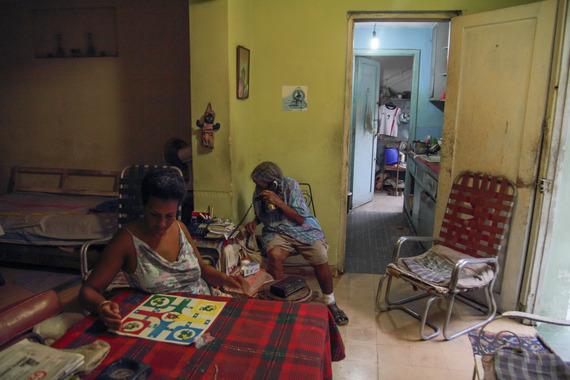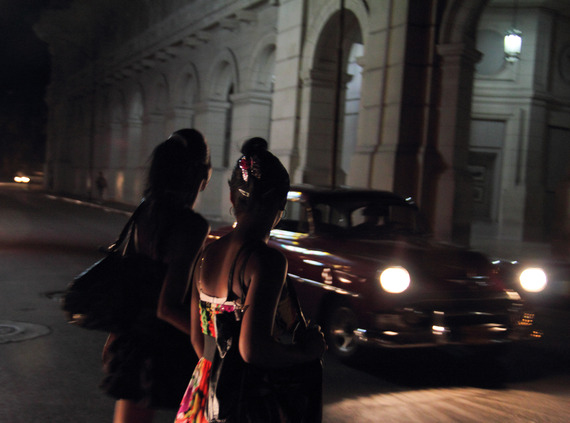Cuba is the easiest place to take photographs in the world. I should clarify. As a photographer, if you want to take an interesting photo, or a pretty photo, or a striking photo, or a heartbreaking photo, or a life-affirming photo, or any kind of photo, Cuba is the easiest place to do that. I'm the product of a pair of anthropologist parents. I've seen lots of places far and wide, and there's no comparison. The photogenic-ness of the island is like a giant video game cheat code for photographers. Step off the plane. Turn on the camera. Click. Snap. Flash. 360 degrees and I guarantee a handful of images that will take viewers' breaths away.
It always starts with the people. In most places on earth, a street photographer who specializes in candid portraits is akin to a purveyor of elicit goods, as if taking such a photograph is a form of theft, stealing the shot. I've felt embarrassed an innumerable number of times as I realize that my subject has realized my goal has been to take their picture. I probably should make more of a habit of asking for permission, but then asking permission brings its own form of embarrassment - who are you and why do you want to take my picture? Not to mention the more significant problem: Once the subject is aware of my existence and the purpose of my having stopped and pointed a camera in their general direction, the relationship between the subject and the camera has immediately changed forever and will never change back.
This is where the people in Cuba help. If I stop to take a picture of a tree, the man or woman walking nearby might very well approach me and ask if they can be placed somewhere in the frame. And these friendly people aren't even what I've come to think of as the "professional pictured" of Cuba. Those are the people catering to the new market of tourists who come and want to bring home a photo with a real live Cuban, so they dress in cartoonishly stereotyped island garb costumes and pose along with tourists in photos. They typically ask for the equivalent of a dollar. Tourists are happy to pay, presumably unaware that a sizable chunk of the population would happily pose with them for free, though Cuba's acceptance of photography goes beyond even this wistful but simplistic notion. Cuba has created an ecosystem genetically designed for the creation and development of art.
Traveling the island, or even just taking a cab around La Habana, it feels as if an endless number of stories are literally bursting out from the seams waiting to be told. As if Cuba hasn't been able to check its mailbox for 50 years and the letters are piled so high that they swamp the entire front porch, the entire yard, the entire block, the stories blind the photographers' non-shooting eye. All I can do is look through my viewfinder and try to capture it - a moment or interaction or expression that would be private or hidden or non-existent in any other country on earth.
And here's the final, secret reason why Cuba is so easy to photograph. Cuba is changing. Modernizing. Except this transformation is happening in a way that would never occur to the people of any other country on earth. All the archetypal photographs that anybody who knows a tiny bit about Cuba would immediately recognize - the skinny old guy with the wrinkled face smoking a giant cigar, the classic American muscle cars, the Malecón, pretty young women, kids playing baseball. Those images still exist and are all still there to be taken. Again and again and again and again. And they are still just as valid and genuine a part of the Cuban experience as they were 5, 10, 15, 20 years ago. Except new images and moments now exist, as if a layer has been added on top of those that existed in the past (and persist despite the changes around them).
But I admit this is where my subjective experience of Cuba, going back to my visits as a child, begins to scramble my impressions. It's impossible for me to ignore what feels like a coarsening throughout Cuban society. I remember like it was yesterday when my great-uncle walked through the small Cuban town where he settled after emigrating from Poland. To my 10-year-old mind, it seemed as if every man who could pass for being over 70 years old came up to him and said they remembered him like it was yesterday (it had been roughly 50 years). He would smile and give them each a $20 bill. And in my last trip I saw a French tourist hold out a handful of sweets to a gaggle of excited children. Instead of handing them out one by one, she tossed them on the ground and laughed as the children scrambled amongst each other to grab as many as possible.
This comparison is unfair on its face, but I can't ignore it. The graft in Cuba used to be so personal. It felt like those old guys didn't just want to go home with a crisp $20 bill, they wanted to believe that they had actually been buddies with my great-uncle way back when. And the men and women of my great-uncle's generation wanted to shake hands and kiss cheeks with anyone who seemed friendly and claimed to remember them, hand out some tzedakah, see their old homes for a last time, then go home to Miami in one piece.
It's become harder for me as a human being to take photos in Cuba, even as taking photos in Cuba has become easier and easier. Maybe I'm just growing up and seeing what was right in front of me all along. I still love going there, walking through the streets with my Cuban-born mother, who has made a profession of writing and teaching about her native land. I still pull the camera up to my eye as quickly as ever. The images are still there to be made. The island continues to be the easiest place to take photos in the entire world. Except now, sometimes, I don't always pull the trigger. Or if I do, sometimes I wish I hadn't.
